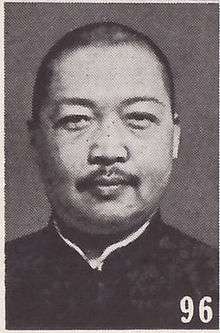Gao Guanwu
Gao Guanwu (Chinese: 高冠吾; pinyin: Gāo Guānwú; Wade–Giles: Kao Kuan-wu;Hepburn: Ko Kango); (1892[1]–1957) was a politician and military leader in the pre-war Republic of China. He was an important politician in both the Reformed Government of the Republic of China and the Reorganized National Government of China. His former name was Yu (愈).
Gao Guanwu | |
|---|---|
高冠吾 | |
 Gao Guanwu as pictured in The Most Recent Biographies of Important Chinese People | |
| Born | 1892 |
| Died | 1957 Shandong, China |
| Nationality | Chinese |
Biography
Gao Guanwu was born in Chongming County, Jiangsu Province. After graduating from the Baoding Military Academy, he became a journalist with the newspaper Minquanbao (民權報). Later he returned to military service, and successively held the offices of Chief of Staff of the Guangzhou River Guard Headquarters, Manager of the Aviation Bureau of Guangdong, Chief of Staff of the Military Governor of Guizhou and other posts. Furthermore, he was appointed Vice-Commander of the 10th Army of the National Revolutionary Army commanded by Wang Tianpei (王天培). During the Northern Expedition Gao Guanwu served as the commander of the National Revolutionary Army garrison in Xuzhou.
In March 1938 he was recruited to join the collaborationist Reformed Government of the Republic of China. He successively held the offices of Vice-Minister for Security and Chief of Nanjing City Office. When later Nanjing City was transformed into Nanjing Special City, he was appointed Mayor.
After the creation of the Reorganized National Government of China headed by Wang Jingwei, Gao Guanwu continued as Mayor of Nanjing Special City. He was also appointed a member of the Central Political Committee, on which he served four terms. In June 1940 he became the chairman of the Jiangsu Provincial Government. In January 1943 he became Governor of Anhui Province. At the end of 1943 he was appointed Governor of Jiangxi Province.
After the surrender of Japan and the collapse of the Reorganized National Government of China, Gao Guanwu went into hiding to avoid arrest. His whereabouts during this period are mostly unknown, but he is known to have died in Shandong Province in 1957.[2]
References
- By the Biographies of Most Recent Chinese Important People, p.57. Xu Youchun (main. ed.), p.1296 wrote his birth year was "1905". But the former matched in his career.
- Xu, op.cit.
- Xu Youchun (徐友春) (main ed.) (2007). Unabridged Biographical Dictionary of the Republic, Revised and Enlarged Version (民国人物大辞典 增订版). Hebei People's Press (Hebei Renmin Chubanshe; 河北人民出版社). ISBN 978-7-202-03014-1.
- Liu Shoulin (刘寿林) (etc.ed.) (1995). The Chronological Table of the Republic's Officer (民国职官年表). Zhonghua Book Company. ISBN 7-101-01320-1.
- The Biographies of Most Recent Chinese Important People (最新支那要人伝). Asahi Shimbun. 1941.
| Political offices | ||
|---|---|---|
| Preceded by Ren Yuandao |
Mayor of Nanjing Reformed Government of the Republic of China and Wang Jingwei Government 1938–1940 |
Succeeded by Cai Pei |
| Preceded by Chen Zenmin |
Chairman of the Jiangsu provincial government (Wang Jingwei Government) 1940–1943 |
Succeeded by Li Shiqun |
| Preceded by Ni Daolang |
Governor of Anhui (Wang Jingwei Government) January 1943 – December 1943 |
Succeeded by Luo Junqiang |
| Preceded by Deng Zuyu |
Governor of Jiangxi (Wang Jingwei Government) 1943–1945 |
Succeeded by Huang Ziqiang |